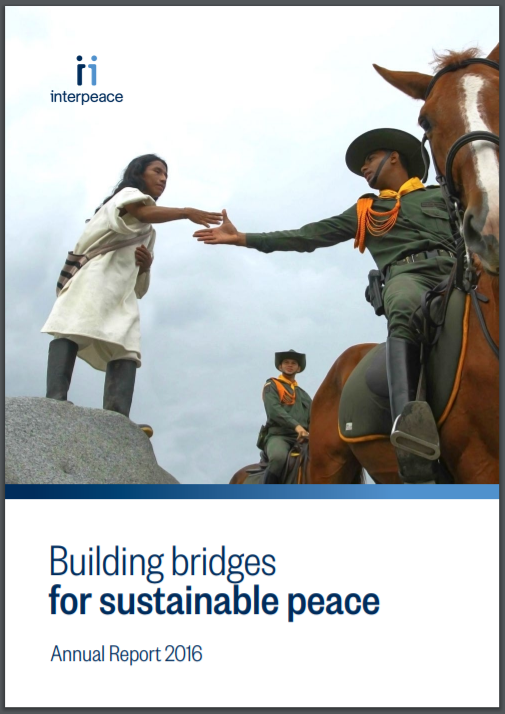Amina Abdulkadir, a researcher from the Peace and Development Research Centre (PDRC), has won the inaugural Women Peacebuilder for Water (WPW) Prize for her contribution towards the resolution of water-related conflicts in Puntland.
Amina, 31, accepted the award on September 27 in Milan, Italy, during the first annual ‘Rules of Water, Rules for Life’ summit, organized by Milan Global, and the Milan Center for Food Law and Policy. She was selected from a pool of ten finalists from Finland, Haiti, Italy, Kenya, Sudan, Somalia, Switzerland, Trinidad and Tobago, and the United States.
The WPW Award was established to honour women whose efforts help build peace in situations where water, as a resource, is a conflict factor. The Award also aims to redraw focus to UN Security Council Resolution 1325 on Women, Peace, and Security. Amina was lauded for her peacebuilding efforts, and particularly for advocating the work of women as peace actors in resolving conflicts between local communities in Puntland, many of which are caused by issues surrounding the sharing of resources such as land and water.
PDRC is Interpeace’s partner organization in Puntland. The organisation has played a key role in the decentralization process to local authorities and bridging the gap between the local communities and the leadership.
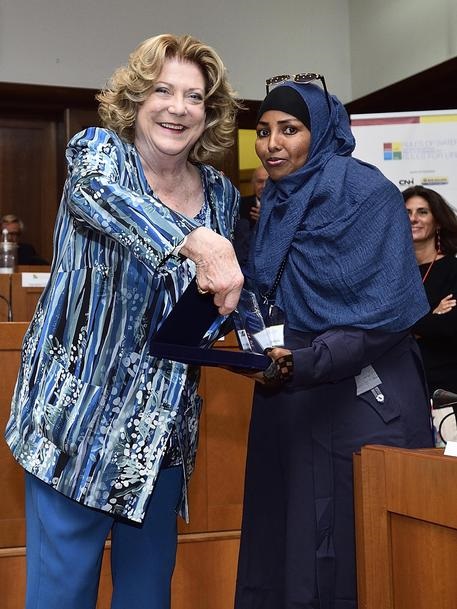
Amina Abdulkadir receives the WPW Prize from Diana Bracco, President of the Milan Foundation for Expo. Photo credit: ANSA
The entire Interpeace family congratulates Amina for providing the much-valued leadership and wisdom of women in building lasting peace.
More than 22 years of work in conflict-affected regions around the world, has shown us that strengthening the links between the different levels of society is a vital element to build lasting peace. Facilitating positive interactions between local communities, civil society and political elites helps re-build bonds of trust and strengthens lines of communication where previously these may have been weak or completely absent.
These mechanisms and strategies that are adapted to each context, help foster political processes that guarantee legitimacy, trust and sustainability, because they are based on the meaningful participation of people from all sectors of society.
Our 2016 Annual Report, “Building bridges for sustainable peace”, illustrates how our Track 6 approach provides an inclusive peacebuilding method in 20 countries around the world. From contributing to build a peaceful federal state of Somalia, to re-building bonds of trust among Malians; and from helping Rwandans heal, to accompanying the Colombian police in its transformation for peace implementation, among many others.
Join us to celebrate the International Day of Peace at the Geneva Peace Talks to be held on 21 September!
Organized under the theme Building Bridges, the event aims to encourage and promote breaking out of silos and working together to generate common understandings and solutions in today’s times where uncertainty has become the new norm. Through personal stories, speakers will share tangible experiences and ideas to inspire people and spark a discussion on how each and every one of us can play a role in reaching out and building bridges.
The following speakers will deliver dynamic and inspiring eight-minute talks on how they are working to promote more peaceful societies, both in Geneva and abroad:
- Kofi Annan – Former Secretary-General of the United Nations and, Founder and Chair of the Kofi Annan Foundation, which seeks to mobilize political will to overcome threats to peace, development and human rights.
- Heba Aly – Journalist and Director of IRIN News, one of the world’s leading sources of field-based journalism about humanitarian crises. She has spent over a decade reporting from conflict zones in the Middle East, Africa and Central Asia.
- Christian Picciolini – Former American Skinhead and Founder of “Life After Hate”, an NGO dedicated to helping others gain the knowledge necessary to disengage from violent extremism. He has won an Emmy Award in 2016 for his role in directing and producing an anti-hate advertising campaign.
- Sihem Bensedrine – President of the Tunisian Truth and Dignity Commission. A high-profiled Tunisian journalist and human rights activist, she has been at the forefront of the fight for human rights in Tunisia, including freedom of speech and women’s rights.
- Azra Hadzic – Architect and Former Member of the National Commission of Bosnia and Herzegovina for Co-operation with UNESCO. Since 2014, Azra works as an independent expert on conservation and restoration projects both in and outside of Bosnia and Herzegovina.
- Sonja Stojanović Gajić – Executive Director of the Belgrade Centre for Security Policy, a leading Western Balkan security think tank. She initiated the Security Research Forum Belgrade-Pristina-Tirana that works on decreasing security dilemma in Serbian-Albanian relations.
- Hyung Joon Won – South Korean Violinist and Peace Activist. In 1990, he performed at the World Economic Forum which celebrated the 1990 reunification of East and West Germany, which inspired him to think of music as a medium of reconciliation.
- Daniel Stein and Saba Temelso – Entrepreneur and Co-Founder of “Cuisine Lab” and Chef at “Cuisine Lab”. This civil society initiative demonstrates an interest in harnessing creativity and culture, to share and learn from each other.
- Hassan Ismail – Peacebuilder from Kenya, who has experienced violent clan conflict several times throughout his life. Hassan has worked as a school teacher, a humanitarian aid worker and now coordinates Interpeace’s new peacebuilding programme in Mandera County.
- Brigadier General Álvaro Pico Malaver - General of the Colombian National Police involved in the FARC negotiations in Havana. He is now head of the Police Unit for Peacebuilding – UNIPEP – committed to all issues related to the cease-fire and the implementation of the final peace agreements.
Read the complete biographies of the speakers here.
The event will be co-hosted by Achim Wennmann, Executive Coordinator of the Geneva Peacebuilding Platform and Viviane Brunne, Political Affairs Officer at UNOG.
Register to attend the event by 19 September here.
If you are not in Geneva, sign up to watch the live webcast here.
About the Geneva Peace Talks
Launched in 2013, the Geneva Peace Talks is an annual, public event organized on the occasion of the International Day of Peace in partnership between the United Nations Office at Geneva, Interpeace and the Geneva Peacebuilding Platform.
This year’s edition is held in partnership with the Geneva Centre for the Democratic Control of Armed Forces and the Global Shapers Community Geneva. The event is made possible with the generous support of the Swiss Confederation, the Republic and State of Geneva, the City of Geneva, and Mirabaud Bank.

Going beyond negative stigmas to transform youth’s agency
Today’s youth generation is the largest the world has ever seen: there are 1.8 billion people between the ages of 10 and 24[1]. This period in a person’s life is critical to their physical, intellectual and emotional development, largely defining their social and economic prospects for the future. Ceaseless energy and vitality describes this coming of age, where youth become pro-active members of society, many times assuming the role of providers and caregivers. According to the United Nations Development Programme (UNDP), one third of youth around the world, live in countries that have suffered a violent conflict, and 75 million of them are currently unemployed.
In many conflict-affected regions of the world, youth are blamed for the high rates of violence, failing to recognize that these forms of violence are symptoms of a greater problem. Illegal economy, organized crime, gang activity, and other forms of violence, are caused by an array of deeply entrenched social and structural factors, including: poverty, inequality and institutional fragility, where youth are the largest population of victims. The World Health Organization (WHO) indicates that over 200,000 youth are killed between the ages of 10-29, which is 43% of the total number of homicides committed globally each year.
In regions like Central America, youth-related violence[2] has been dealt with by using repressive mechanisms that go from massive incarceration to extrajudicial killings, failing to identify the social and economic causes of conflict. In regions like West Africa, civilians lose faith in the authority’s capacity to protect them against youth-related violence, and in desperation communities organize self-defense actions that inevitably prolong violence.
As a result, in many countries around the world, youth have been stigmatized and marginalized as the main protagonists of criminal violence. Often viewed as dangerous and a threat to society, they are subject to negative stereotypes that perpetuate vicious cycles of violence. On the other hand, youth are also viewed as vulnerable and helpless. This predominant negative discourse however, has been challenged by recent policies and research, that acknowledge youth’s agency and positive role in society, and how their involvement in decision-making processes is crucial in developing sustainable and legitimate solutions.
It is vital that we stop fearing young people and start acknowledging them as partners in the development of society. As a peacebuilding organization, Interpeace has worked with youth groups in Latin America and Africa, for over 20 years, to try to better understand youth-related violence, identifying the factors that cause it, and subsequently developing strategies to help this vulnerable generation become positive agents of change in their communities.
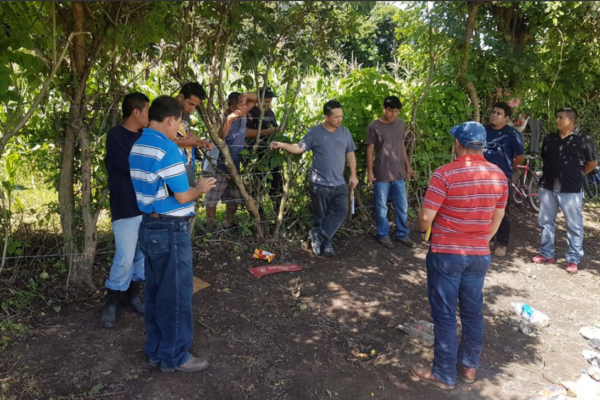
Workshop in El Salvador. Photo credit: Interpeace
Identifying the root causes of youth-related violence
There is growing interest in young people’s engagement in new forms of violence, which are generally being analyzed through lenses of radicalization and violent extremism. As the international community seeks to eradicate this phenomenon, it is crucial to understand its structural and root causes.
Over the past few years, new forms of violence have started to emerge in Côte d’Ivoire and Mali. In Abidjan, young men between the ages of 8 and 25 join organized youth groups, commonly referred to as “microbes” (germs). These boys are accused of violent robberies, and in some rare cases of homicide. In Mali, the reactivation of diverse armed groups, who claim to be inspired by a jihadist ideology, has increased the levels of violence in the region. As a way to cope with this crisis, Interpeace, with its local partners IMRAP and Indigo Côte d’Ivoire, conducted a participatory research to understand the trajectories of young people towards new forms of violence. Over the course of seven months, with the support of UNICEF, researchers engaged with 741 people from a range of communities in Côte d’Ivoire and Mali.
The report “Beyond Ideology & Greed: Trajectories of Young People towards New Forms of Violence in Côte d’Ivoire and Mali,” was launched at the end of 2016, with research findings that truly urge people to challenge their preconceived ideas about the root causes of this social phenomenon. It is widely believed that unemployment and religious ideologies are pivotal factors that contribute to radicalization and violent extremism in West Africa, but the research findings show that these elements are, in fact, secondary. Research showed that the most important factor of youth’s involvement in new forms of violence is their need to find their place in society, to be recognized and valued in their communities. Therefore, young people engage in violent activities because these youth groups represent a structure where they can “be someone”. Moreover, the research identified a phenomenon of “professionalization of violence,” which describes how youth acquire social acceptance and value, through a positive recognition of the violence they perpetrate.
Therefore, after 10 years of working in Central America, we have arrived to similar conclusions: dynamics that push young people to join or remain in violent groups are often related to identity, opportunities for social mobility and the security of belonging that comes from being a part of a group.
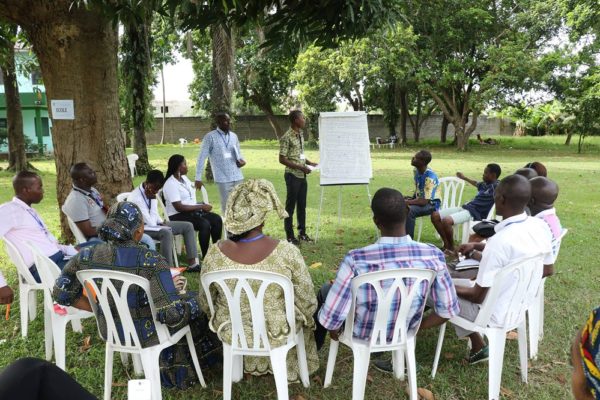
Workshop in Côte d'Ivoire. Photo credit: Indigo
Implementing structures that provide positive sources of identity and recognition
A person’s identity is defined by their immediate relationships- their relationship with family members, friends, co-workers and their community. “Being someone” is determined by the recognition of their peers, and in turn, recognizing one’s identity determines a person’s place in the world.
In the life of a young adult, determining their place in society is an invaluable factor that greatly contributes to their actions and lifestyle. Finding a place in the world and most importantly in their immediate world, is of critical importance. Therefore, for vulnerable youth in conflict-affected regions like West Africa and Central America, their identity is built around the only structure that gives them the possibility to feel part of a group: violent youth groups. As a result, providing an alternative social structure that can enable youth to build an identity without the use of violence is necessary to help prevent and eradicate youth-related violence.
Central and South America have the highest homicide rates in the world; and gang activity and juvenile delinquency are two of the main factors that cause these high murder rates. Interpeace has been working in Latin America since 2007, leading participatory processes to develop comprehensive public policy proposals, to prevent youth-related violence, and implementing peacebuilding initiatives with at-risk youth. At the beginning of 2016, Interpeace began developing the programme “Comprehensive initiatives to prevent violence in El Salvador.” The project works with at-risk youth between the ages of 18 and 29, with the objective to help them build capacities for entrepreneurial activities. This programme entails three specific steps: the first is to provide young adults with the necessary tools and methods to peacefully transform conflict. The second step, consists on training these young adults in the field of entrepreneurship. And lastly, the third step involves overseeing the establishment of productive associations and providing seed capital, specifically for materials and equipment to enable the implementation of their entrepreneurial ideas.
Interpeace is aware that this project will not stop historical inequality and poverty rates in El Salvador. Providing vulnerable youth with resources to build their own businesses, can help improve their living conditions, but this is not the ultimate goal. As indicated by years of accumulated knowledge in the region, vulnerable youth need positive social structures that can provide them with a sense of identity and belonging. In this sense, engaging in new trades and starting their own enterprise, is providing vulnerable youth with non-violent social structures that enforce social cohesion, social recognition and the possibility for social mobility. Therefore, the most important activity in helping provide job opportunities for youth is not the job creation itself, but rather the close accompaniment that ensures that having a job translates into gaining social recognition.
As a result, through these initiatives, vulnerable youth are provided with a sense of identity, confidence and solidarity, which are values that attract them to join violent groups, but in non-violent and non-criminal ways. Essentially, helping them develop their own business is providing an alternative, so that violence is not a vital part of their identity.
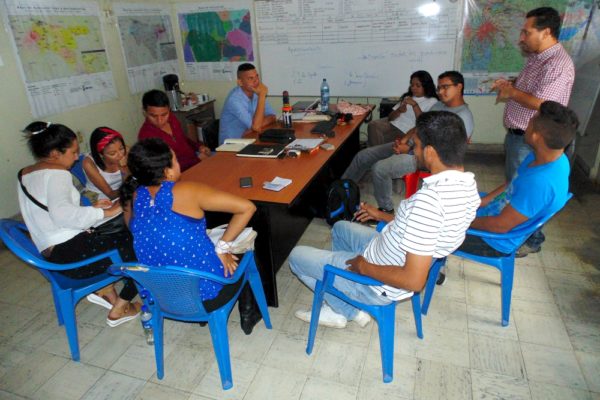
Workshop in El Salvador. Photo credit: Interpeace
Vulnerable youth as peacebuilders
As research shows, young people’s need to feel part of a group and feel recognized, are the driving forces behind their biggest decisions and actions. Unfortunately for vulnerable youth around the world, the social structures that surround them are in many ways fueled by criminal and illegal activities. In turn, marginalization and exclusion continue to undermine their agency and their possibility to make positive changes in their community. This is the reason why youth are at the center of our peacebuilding initiatives in West Africa and Central America. Identifying root causes for youth-related violence and helping youth develop their identity through positive social structures will help trigger more legitimate and sustainable solutions.
Because the exclusion and marginalization of groups in society, sow the seeds for renewed violence, our peacebuilding programmes are designed to include participants from across society, engaging groups that are typically overlooked. This inclusive approach ensures that all social groups share a sense of ownership and responsibility for reconciliation and rebuilding their society. Working with at-risk youth therefore empowers this sector in society, to participate in defining their own problems and finding long-term, sustainable solutions.
“We need to stop seeing young people as a threat and make them part of the solution. That starts with engagement. We need to listen to their hopes and fears and make their voices audible in the debate on the present and the future.” Interpeace’s Director-General Scott Weber
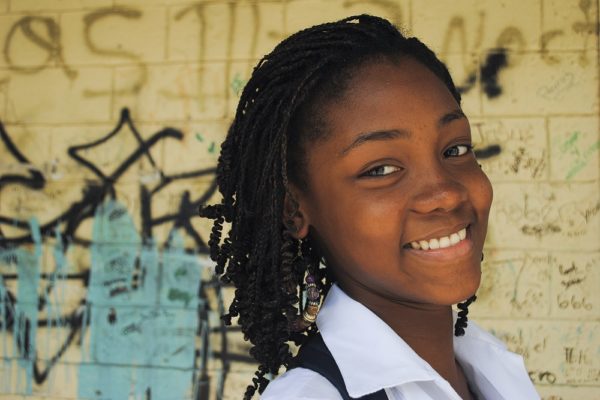
Honduras. Photo credit: Armando García
[1] According to the United Nations Population Fund – UNFPA.
[2] Youth-related violence in Central America is understood as violence where youth are perpetrators and victims.
"Youth participation is a right, and resolution 2250 is a tool for also achieving this in Sweden." - Rosaline Marbinah, Chairman of the Foreign Policy Union in Sweden and Vice-Chairman of the National Council for Swedish Youth Organizations (LSU)
Just over a year ago, the UN Security Council adopted Resolution 2250, the first ever resolution on the topic of youth, peace and security. Interpeace’s Project leader in Sweden, Tomas Amanuel, participated in a panel discussion during the Almedalen political week in Sweden on what this resolution means and how the work of implementing it is coming along. The conference was organized by the Foreign Policy Association in collaboration with the Folke Bernadotte Academy (FBA), the agency for Peace, Security and Development.
The panel discussion was moderated by Max Landergård and participants included: Ulrika Modéer, State Secretary to Isabella Lövin, Minister for International Development Cooperation; Rosaline Marbinah, Chairman of the Foreign Policy Union in Sweden and Vice-Chairman of the National Council for Swedish Youth Organizations (LSU); Chris Coulter, Head of the conflict prevention Program at FBA, and; Tomas Amanuel, Project leader for Interpeace.
Youth's participation - an important aspect of achieving resolution 2250
Ulrika Modéer began the conversation by pointing out that the number of conflicts in the world is increasing, and at the same time, half of the world's population is under the age of 24. Therefore, it is not only reasonable, but necessary to include young people in decisions that will greatly affect the future.
UN resolution 2250 aims to achieve this and strengthen young people's participation and influence on issues of peace and security worldwide. But what are the challenges and how can we create the conditions for success?
A shift in youth engagement
In Sweden, young people often engage in associations that are focused on single political issues or associations in sports and culture. Today, it is more likely that young people will be found in sports associations or music studios than in political parties or movements. It is a global trend that while more and more young people engage and organize themselves, interest and trust in traditional politics seem to decrease. So how to increase youth involvement in politics when many young people are becoming less and less interested in politics as we know it?
The panelists agreed about the importance of local ownership to strengthen the desire of young people to participate in democratic processes. Interpeace's work with young people in socio-economically vulnerable areas in Sweden has been possible through close collaborations with local organizations and actors who are active and anchored in the specific areas where we work. Through these key people, it is possible to gain an understanding of the dynamics of the area, about what works well and what needs to change and how youth perceive the changes taking place.
The new ways in which youth engage also create a need to develop new forms to support and mechanisms for funding these movements. One way to win back young people's trust can be to review the various barriers that exist at a local level. Most often, there are high demands for formal organizational structures in order to receive financial support, demands which are often difficult for youth to live up to. The resolution has already helped to raise awareness of the need to review these barriers and find new ways to support young people's participation on their own terms.
"How do we finance young people's involvement in less formal ways? We must dare to take more risks! " - Chris Coulter, Head of the conflict prevention Program at FBA
When young people themselves define the problems they face and come up with ideas for solutions, their commitment increases. Moreover, their involvement helps provide long-term legitimacy and sustainability to the solutions that are developed. Including young people in decision-making processes should therefore be seen as a success factor that contributes to more effective and sustainable results.
"Youth's ability to organize is one of the most important issues of the resolution." - Tomas Amanuel, Project leader for Interpeace Sweden
Publication Summary
This report presents the findings of a year-long consultation process to establish the challenges to peace in Kenya’s Mandera County, as perceived by the local communities of the County.
Titled Voices of the People: Challenges to Peace in Mandera County, the report captures the first-hand views of grassroots communities across the County. It also includes the views of other stakeholders such as Nairobi-based elites who hail from the County; key informants in the neighbouring Wajir County; the leadership at both the county and national levels; and communities living along the international borders with Somalia and Ethiopia. It was imperative to seek the views of such a diverse spectrum of stakeholders because issues of peace and security in Mandera often have a cross-border dimension in addition to the tenuous clan relations.
Mandera is part of the arid rangelands of North Eastern Kenya, situated along the country’s restive tri-border with Ethiopia and Somalia. Although it has a near-homogenous ethnic Somali population, conflicts between the various Somali clans often degenerate into internecine violence, many times with cross border spillovers.
The following four challenges were identified and prioritised, by the local population, as the most pressing impediments to peace in Mandera:
- The lack of effective social reconciliation processes.
- The lack of trust between the local population and the security agencies.
- Border disputes.
- The lack of coordinated policies and mechanisms on cross-border security, movement, and trade.
This publication is the first from the Mandera Peacebuilding Programme, which is jointly implemented by the National Cohesion and Integration Commission (NCIC) of Kenya and Interpeace. The programme’s aim is to facilitate the achievement of an effective, locally owned peacebuilding architecture for sustainable peace among the communities of Mandera. It marks a departure from past interventions, which focused on ending conflicts that had already turned violent—often using the security agencies without subsequently addressing the underlying trigger factors for purposes of building long term peace.
Read the full report (PDF)
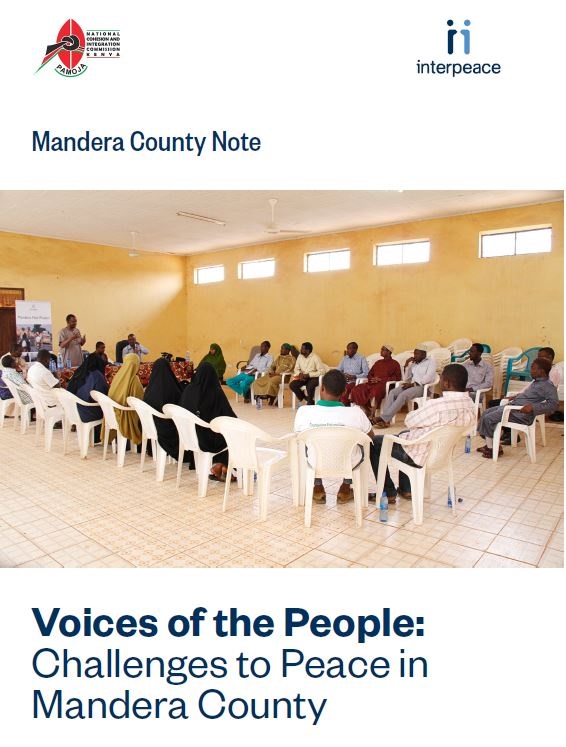
Read also:
